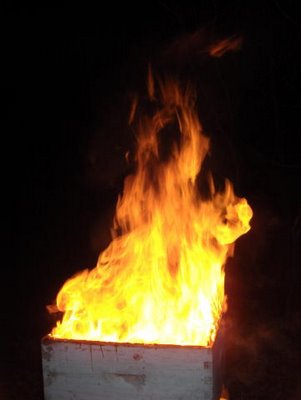
For the last two weeks, we have made the rounds and visited each colony of bees. There is a lot of walking as the land is too wet to drive on to get closer to each yard this is part of the sacredness of the journey. The quietness of the fields is punctuated by the birds and gentle winds.
After four months of winter, packing cases and insulated wraps are taken off. Boxes of honey are transferred from the hives that have died, and do not need it, to those that are alive, and hungry for more food. It is a very symbolic act as one member of the family gives new life to another.
As beautiful as Spring is with all of the birthing on the land, this greeting of the bees is a very somber time for me as many of the bees have passed on. With the decline of the bees worldwide because of the deterioration of the water and the air, these loses are very evident each day in the Spring. Working organically with our bees, we do not use chemicals that could artificially keep them alive. The exciting news is that we are seeing the light and hope of the turnaround in the health and strength of our bee populations. Now we are in the second year of a long term program to raise queens bees from the survivors. In these last weeks, we saw that queens Sam raised last year overwintered the best and were among the strongest. This gives us great encouragement to continue. I understand that while moving the bees South two winters ago enabled us to build them up after their loses and make a huge crop last season, it does not make them stronger our work with queen bees is a vital part of the path to sustainability and better health for the bees and beekeepers.

where our honey house is now and many of our bee yards are.
across Lake Champlain are the Adirondack Mountains
For over 100 years, the bees have been challenged by American Foulbrood, a major disease of the young bees, the “brood”, that has a distinctive odor, called “foul”. It kills the bees, but does not harm the honey. We have learned to smell it when opening up a hive. Our bees do not have much of this as we work organically with them a hive will be burned when discovered and the disease and weaker bees taken out of circulation. Drugs will only mask the symptoms and not get rid of the bacterial spores. The drugs allow the disease to spread throughout an operation. Because of the extensive use of drugs for this disease, much of the Chinese honey on the market in recent years has been contaminated. Last night I burned a hive that Tim had found earlier in Charlotte. The burning is conducted with great respect for the bees to not do this would threaten and weaken each of their other families in this community.
The fire that burns away that which is not wanted is a metaphor for many of us personally this Spring. As we moved the honey house to Route 7 in Ferrisburgh, we made a huge fire and burned that which we needed to clean up and remove from our work. The moving was a team effort and was a time to reflect on some things that I feel are important over all the years in our most honorable honey house:
- The healing goodness of elderberry has been shared with many via our elderberry extract and the distribution of plants each season.
- We work with the Amish community, on their land and with their families. Dan Miller was encouraged to build bee equipment for us, and a family business was born and has grown to serve the beekeeping community in New York State and the region.
- There is another side of the story with an invasive plant like purple loosestrife, which is involved in enormous healing as well as providing tons of honey to pollinating insects.
- We have seen that people working together can make a difference in their health and in the market. Our work is a string of partnerships across the land, and for that I am most grateful.
Because of your interest and support of the bees through the market, they will survive, get stronger and prosper. Thank you so much.